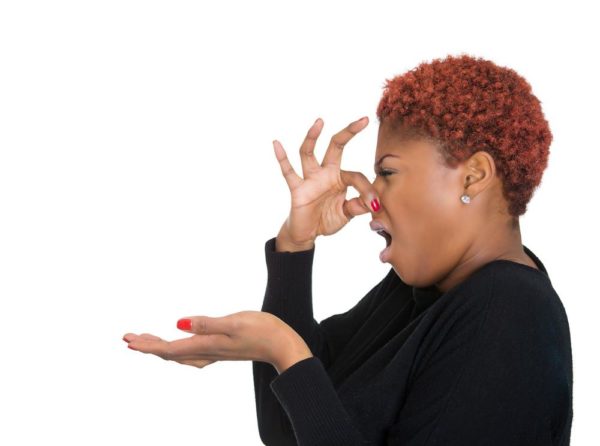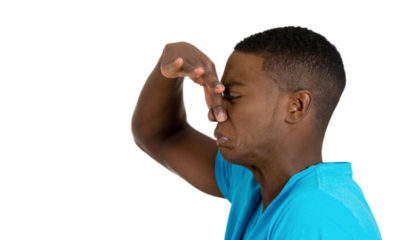Features
Dr. Nesochi Okeke-Igbokwe: 7 Questions To Ask Yourself If You Have Bad Breath
 There is nothing more uncomfortable than having to endure a lengthy conversation with someone with not-so-fresh breath. Perhaps you try your best to ignore the unpleasant smell and continue on with the discussion as if you never noticed any odor at all. Or maybe you even try to hold your breath and cut the conversation short in order to escape the odor. If the person is a close friend or family member, you may even just go for the honest approach and politely inform them that their breath smells bad (so they are at least aware of the problem in case they already didn’t know). No matter how you decide to deal with such awkward situations, you must realize that bad breath (also known as halitosis) may really affect just about anyone. No one is immune to the problem and no one certainly ever wants to be that person everyone avoids on account of offensive breath.
There is nothing more uncomfortable than having to endure a lengthy conversation with someone with not-so-fresh breath. Perhaps you try your best to ignore the unpleasant smell and continue on with the discussion as if you never noticed any odor at all. Or maybe you even try to hold your breath and cut the conversation short in order to escape the odor. If the person is a close friend or family member, you may even just go for the honest approach and politely inform them that their breath smells bad (so they are at least aware of the problem in case they already didn’t know). No matter how you decide to deal with such awkward situations, you must realize that bad breath (also known as halitosis) may really affect just about anyone. No one is immune to the problem and no one certainly ever wants to be that person everyone avoids on account of offensive breath.
Nonetheless, it is important to understand some of the factors that can come into play and contribute to the issue. We all know that certain spicy foods and of course inadequate oral hygiene are the usual suspects when we talk about bad breath. If you have a strong penchant for eating garlic or onions all the time, then you might face issues with bad breath. If you don’t brush your teeth, floss, or clean your tongue regularly, then you will also undoubtedly experience some degree of bad breath as well. But those common causes aside, there are still other reasons that your breath may smell horrible at any given point in time.
Here are a few questions you may want to consider the next time you experience bad breath:
Is my mouth dry?
Dry mouth is a major contributor of bad breath. Your saliva contains certain protective and cleansing properties helping to control and fight off some of the undesired bacteria in the mouth that can cause bad breath. When your mouth is super dry, bacteria can thrive there and lead to an unpleasant odor.
Most people have experienced that ever so dreaded “morning breath” when waking up. This occurs because while you are asleep your salivary flow tends to really slow down. When there is less saliva in the mouth, the oral cavity can begin to dry up and may become a great environment for bacterial growth which may precipitate a foul odor. If you are one to sleep with your mouth wide open at night, then that can also dry out the mouth even more and lead to even worse breath in the morning.
Am I dehydrated?
Dehydration may be a non obvious culprit triggering your bad breath. Essentially, when you are dehydrated, your salivary secretions may decrease (causing dry mouth) and subsequent issues with halitosis. Therefore, maintenance of adequate hydration is always important, especially during very vigorous workouts. You may notice that sometimes your post workout breath is not always the greatest. If you were panting during that intense workout and did not take in enough fluids, the mouth may become dry and an unpleasant odor may arise.
Have I been breathing through my mouth?
If you are someone that chronically breathes through your mouth instead of your nose, then that may negatively impact your oral health. Mouth breathing may be exhibited in those who snore while sleeping and those suffering from obstructive sleep apnea. You are more likely to experience frequent dry mouth and bad breath if you are a mouth breather.
Could I possibly have a chronic medical condition (e.g. autoimmune disorder, metabolic disorder, etc.)?
If you are truly taking good care of your oral hygiene, yet you seem to still experience chronic issues with bad breath, it could be possible that there may be an underlying medical condition linked to your problems with halitosis.
For example, there are certain autoimmune disorders that affect the salivary glands such as Sjögren’s syndrome. This condition can lead to the destruction of some of the saliva
producing glands in your body and cause chronic problems with dry mouth and bad breath.
Diabetes Mellitus is a metabolic condition that has also been linked to bad breath. When the condition is uncontrolled, it can cause ketoacidosis and produce an unpleasant fruity odor on the breath. If you are a diabetic, blood sugar control is absolutely crucial.
Could any of my medications be causing this?
It is very well possible that your medications are the cause. There are certain meds that have the side effect of causing dry mouth and bad breath. Some antihistamines and specific classes of anti depressant drugs fall into this category. Having knowledge of the side effect profile of all the medications you are taking is always key. It’s a good idea to routinely review your entire medication list with your doctor.
Might I have an infection?
There are various infections associated with halitosis. Sinusitis or tonsillitis are just two examples of infections that may lead to issues with bad breath. If you find that you have recurrent problems with your sinuses or tonsils, it may be a potential source of the foul odor.
If I smoke cigarettes, should I stop? Can it contribute to bad breath?
Absolutely! If you smoke cigarettes or chew tobacco that can lead to horrible breath. Tobacco contains many noxious chemicals and toxins such as nicotine which can promote and even exacerbate your bad breath. There are several health benefits to quitting smoking, one in particular being an improvement in your oral health and of course better breath.
Here is the takeaway message: always remember that if your battle with bad breath continues to be an ongoing issue, despite maintenance of great oral hygiene practices, then it is really essential to seek out a comprehensive dental and medical evaluation to determine the source of your problem. There are many possibilities why your breath may smell bad. Figuring out the underlying cause will help you get closer to solutions to help tackle the problem and avoid further embarrassing social situations.
Photo Credit: © Kiosea39 | Dreamstime





















